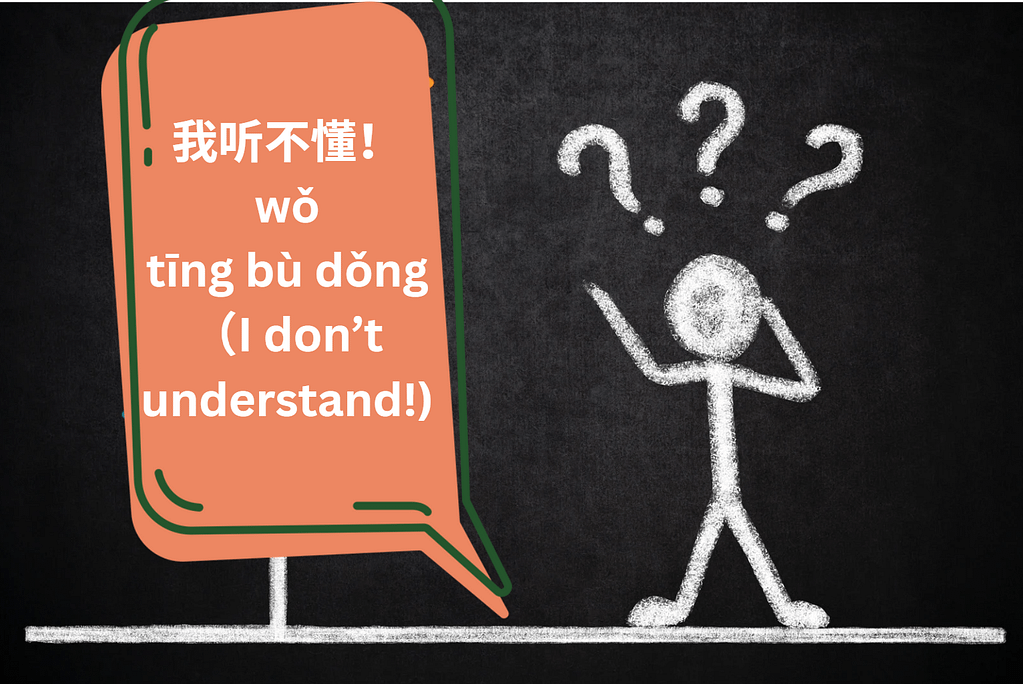Learning Chinese has been one of the most important personal and professional developments in my life. While my Chinese is still far from perfect (I very much have a “foreigner accent”), and sometimes find myself in situations where I’m out of my depth (like understanding medical terms when I take my dog to the vet…), I can use it professionally, have friends I speak to exclusively in Chinese, and feel comfortable walking into new situations where Chinese is the spoken language.
However, the journey here was not smooth! In this article I’m sharing my personal story of learning Chinese – my aim is not to scare you away from Chinese (it’s a beautiful language and so rewarding), but rather to let you know you’re not alone if you’re struggling, and provide useful tips and advice gained from personal experience.
Watch me introduce my story of learning Chinese (in Chinese, with abbreviated subtitles in English) here, or read on for the written version:
The Five Stages of My Chinese Journey
Stage 1: Youthful Arrogance
I first moved to China at the age of 21, as a young recent graduate. I wanted to see the world, and as a rapidly rising economy with a huge population, China seemed like a good choice. I got a place on a 1-year British Council program teaching English in a small but dynamic city in Southern China called Foshan.
Naively, I assumed that just by living and working in China I’d automatically pick up Chinese without much effort. Obviously, this was completely wrong.
Chinese is so different from English that it was just impossible to understand (and therefore naturally absorb) anything at all without an already-established basic to intermediate vocabulary base. While I quickly learned from others how to say important survival phrases (“where is the bathroom?”) (“sorry I don’t understand…”), without active effort to memorize new vocabulary and learn about the structure of the language, I didn’t progress much beyond these.
However, I loved life in China (the food, the openness and friendliness of the people, the dynamism and constant rapid change), and knew I wanted to return someday. As a result, I ended the year with the realization that I’d learned very little, and a sense of regret and deep disappointment at the wasted opportunity.

Stage 2: Trying to Learn by Myself
I returned to a Masters degree and job on a graduate scheme in London with renewed determination to make up for lost time. However, I faced two problems: (1) I couldn’t afford Chinese classes (life in London is expensive!), and (2) I didn’t have – and couldn’t find – any Chinese friends in London to practice with.
My solution: I bought Rosetta Stone CDs (yes, I’m old enough to have been using CDs instead of apps…) and studied with them after work. Rosetta Stone’s method of small learning chunks that fully immerse the learner and mimic the way that children learn languages was effective, and I learned more in London than I’d learned in China. (Enough to over-confidently change my iPhone’s language settings to Chinese, before promptly changing them back when I realized I could no longer understand my much of the content of my phone…🤣).
However, I hit a wall after completing Rosetta Stone, and needed contact with actual humans in Chinese to progress further. I also missed China, teaching, and academic life terribly, and after much deliberation made the decision to move back to China with the aim of doing a PhD and entering academia.

Stage 3: Finally, My Efforts Bear Fruit
I returned to China – at first to a low pressure job that gave me time to focus on language learning and PhD applications – and then to a PhD program at Fudan University in Shanghai, one of China’s top schools.
At this stage, my language learning took off exponentially. I credit this with four main factors:
- Making friends that I spoke to in Chinese: Some of these were Chinese native speakers, but many were students from other countries like Korea and Japan who were more comfortable in Chinese than English.
- Finding a hobby that I did exclusively in Chinese: Sports have always been a huge part of my life, and at that time my sport was badminton. I joined my departmental team, and would hang out at the school badminton courts several evenings per week. Because I enjoyed it, it felt like no effort at all to have a game followed by post-match chatting in Chinese.
- Attending classes in Chinese: I took advantage of all the free language classes offered by Fudan, as well as auditing Chinese-taught courses in my field. Finally, I had teachers correcting me and giving me homework!
- Signing up for HSK exams: The HSK is the Chinese government’s official series of language tests, which get progressively harder with each level. While the HSK itself is not particularly interesting, I hate failing tests so each looming exam date gave me a strong incentive to study. (Happily, I passed all of them.)
By my penultimate year at Fudan, my Chinese was good enough to access Chinese language research materials, conduct research interviews in Chinese (although I found this utterly nerve-wracking at first!), and feel comfortable that I could communicate (albeit imperfectly) in most situations.

Stage 4: Going Backwards in a Fully-English Language Work Environment
After Fudan I landed a postdoctoral position at New York University (NYU) Shanghai. While this was an amazing professional opportunity, it was terrible for my Chinese. My Fudan friends had mostly moved away after graduation, and because NYU Shanghai is a joint-venture campus, my work environment was now entirely in English. I was also busy learning how to teach undergraduate students.
The result was that I stopped using much Chinese in my daily life except in basic circumstances like ordering food or hailing a taxi. I no longer faced more complex situations in which I had to speak Chinese, and I lost the ease of communication that I’d developed while at Fudan. In turn, my confidence to make new friends or take up new hobbies in Chinese disappeared.
After my postdoc, I took a faculty position at Duke Kunshan University (DKU), Duke’s joint venture campus in China. Again, this was an amazing professional opportunity, but my work environment remained fully-English and I continued to live in a “foreigner bubble” in Shanghai and commute to Kunshan, so the stagnation in my Chinese ability continued.

Stage 5: Onward Again! My Chinese Today
In 2022, a major turning point occurred. I was unfortunately caught in China’s zero-COVID Shanghai lockdown, and this experience prompted me to move out of Shanghai to Kunshan. This move turned out to be absolutely fantastic for regaining and improving on the language skills I’d developed at Fudan.
Because of the ongoing zero-COVID policies, I couldn’t travel back from Kunshan to my English-speaking bubble in Shanghai easily, and with most of my foreign colleagues still unable to return to China due to pandemic border closures, to have any semblance of a social life I was forced to overcome my nerves and make local friends. Kunshan being a relatively small city where few people speak confident English, this meant speaking lots of Chinese.
I joined a local boxing gym, a local running group, made small-talk with my neighbors, and accepted invitations to hang out with people. My confidence and ease of communication returned, and with it the ability to pick up new vocabulary just through my everyday life. (In fact, the first time took a boxing class in English – my native language – while on a trip overseas, I couldn’t understand much because all my boxing had been learned in Chinese!).
While my Chinese is by no means perfect (accent and grammar are major weaknesses), I am now comfortable in most personal and professional situations (and confident enough to post a video of myself telling this story in Chinese on the internet).

My Key Tips for Chinese Learners
Nowadays, my foreign friends often ask me for tips about how to learn Chinese. Here are my two key ones:
- The first stage is the hardest, but keep going. It feels like wading through treacle – you have to memorize vocabulary, learn about a totally different language structure, all while not knowing enough to communicate. However, once you can start to talk to people, read, and pick things up naturally, the rewards are immense, so persevere.
- Most importantly, don’t be afraid of making mistakes. Get out there, make friends, and take up hobbies in Chinese. Unless you are planning to be a professional translator, 100% perfection is not the goal. Instead, aim for the ability to communicate and live a life largely unconstrained by language barriers (Chinese friends – feel free to point out the errors in the video above!).
Conclusion
Learning another language not only makes life in another country much easier, it opens doors to new friendships and cultural understanding. But, it’s not easy. My pathway to learning Chinese was full of ups and downs, and language learners shouldn’t be discouraged by that difficult first stage, life events that knock study off course, or fear of making mistakes.
If you’re a foreign student or educator (or anyone else) in China wondering if it’s worth putting the effort in, the answer is yes!

Would this article be helpful for someone you know? Click the links below to share ⬇
Check out more tips for academic success by following Discovery Hub on social media ⬇
Add Discovery Hub’s Official Account and Pippa on WeChat ⬇

Copyright @ 2024 Discovery Hub Educational Consulting (Suzhou) Ltd 探索枢纽教育咨询(苏州)有限公司